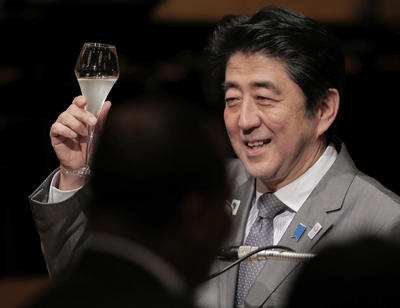Abe and the LDP consider that the present Constitution limits Japan’s national security options, constrains government control of civil society, and prevents Japanese respect for nationalistic symbols. By constitutional revision, the LDP seeks to change this. The immediate focus is revision of Article 96, which stipulates a legal process for constitutional revision, to make subsequent constitutional amendment easier to pass through the Diet (prior to the referendum stage). The Japan Restoration Party, the Your Party, and some lawmakers of the Democratic Party of Japan (DPJ) support this move despite their different views on a new constitution.
Constitutional revision could have a critical impact upon political and social relations in Japan. The written Constitution is a superior law, and Japanese political processes rest upon it for legitimacy. Moral and political authority is sometimes derived from it. What is literally written in the Constitution is important in guiding political and social practices in Japan’s political and legal culture.
Japan has maintained the present pacifist Constitution since 1947. While this has constrained the use of force (through Article 9) it has also realised a more liberal and affluent society. The old-generation conservatives in the LDP, however, sought constitutional revision to allow remilitarisation and to restore Japan’s prewar traditions — a goal of the LDP’s in the 1950s and the 2000s that has never been realised.
The LDP’s campaign for constitutional revision is replete with misguiding political slogans. It avoids balanced evaluations of the present Constitution and prevents wider public debate, thus having a negative impact upon democracy in Japan. In the political campaign for constitutional revision, Abe’s and the LDP’s slogans are designed to inculcate a pro-revisionist mood in the public. Three main assertions are used to justify constitutional revision.
The first one is that ‘the present Constitution is not a Japanese constitution’. Abe suggests that the present Constitution was imposed during the occupation period (1945–52), and declares that a new constitution should be made by Japan itself. This reflects the traditional view of rightist groups in the LDP. The LDP especially criticises the pacifist preface of the Constitution by saying that it is too awkward to be called a Japanese constitution. However, it ignores the fact that the pacifist Constitution was welcomed by the public during the occupation and has become deeply rooted in postwar Japanese politics and society. The direct linkage between the origin of the Constitution and the necessity of its revision is misleading.
Second, Abe and the LDP argue that the present Constitution should be changed because its time has passed. They assert that the Constitution should meet the needs of the present and that Japan is the only advanced country which has not revised its written constitution. They propose, for example, the written inclusion of new rights such as the right of the environment and criticise Article 89, which prohibits government funding for religious bodies including their private schools. However, this view ignores the accumulation of precedents by Japan’s courts and government views, which have resolved problems that the LDP criticses. The environment has been partly recogonised as a constitutional right, and the government can provide funding to private schools via a third body as a present law allows.
Third, Abe and the LDP emphasise the importance of a national referendum in the process of constitutional revision in their effort to court the public. They appeal to the public by stating that the Japanese people are sovereign and entitled to revise the Constitution by their own hands. A referendum is upheld as an ideal, but direct democratic representation can lead to extremes. In the case of Japan, the recent rise of popular politicians such as Junichiro Koizumi, Shintaro Ishihara and Toru Hashimoto has been possible because of a public that was easily affected by emotional political phrases, at least in the short term. However, the policy achievements of these populists have been poor. Abe’s slogan, ‘the referendum as the will of the sovereign’, seeks to appeal to the public in a similar way to slogans used by those popular politicians.
These moves to revise Article 96 tactically avoid public debate. But, worryingly, this approach could create instability in Japanese politics in the coming years, making it easy for the Constitution to become a political issue in any national election, given it will become easier for one political party to campaign on changing it. The political and legal authority behind Japan’s politics would become fragile and shaky. Lowering the bar for constitutional revision in Article 96 would bring about unnecessary confusion to Japan’s politics. By pressing for constitutional revision, Abe and the LDP are paving the way to political instability in Japan.
Toshiya Takahashi is a PhD candidate at the National Security College, Australian National University.

